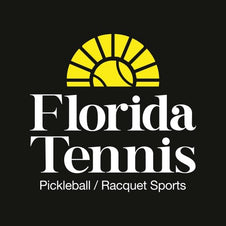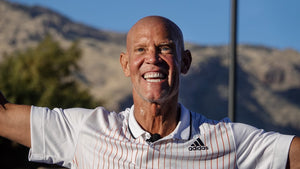Murphy Jensen: Rock & Roll, Recovery & Resilience
Jul 29, 2025
“I owe my life to the game of tennis in the world of tennis for praying for me and for loving me.” Murphy Jensen told Florida Tennis, reflecting on a career that’s taken him from tennis glory to transformational impact. “Live this life with an open mind and an open heart, you cannot lose with this attitude.” That life began on a backyard court in Michigan, where he and his brother Luke built something special. “We built our own tennis court in our backyard with our bare hands.”
One of Murphy’s biggest achievements was winning the French Open in 1993 with his brother Luke. Murphy reflected on this emphasizing the magnitude of this achievement. "We won the French Open—and, arguably, it’s the first real tournament I’ve ever won on the tour. I’d won some challengers, but not a main tour event. I’m pretty sure I hadn’t even won one at that level yet. So the first tournament I actually win is the French Open. That’s crazy. And I did it with my brother. It blew up. But I’ll never forget sitting in that locker room... I didn’t even know we were supposed to go get the trophy." With that achievement, rock and roll tennis was born. “I come back to the court and Rolling Stone is there, Sports Illustrated is right here. With the sudden fame we even ended up on a fishing boat with ESPN—all hell broke loose."

Photo courtesy of Muphy Jensen
Murphy Jensen opened up about his battle with mental health challenges over the years—and shared what it was like sitting alone in the locker room after winning the French Open. "I looked down at my hands, and they were shaking. Then I got sick. My head just wanted to be anywhere but where it was. What I’ve learned now—after working in the mental health space for the past 10 years —is that I had a panic attack. I got sick in the shower. I cleaned up, went to the press conference, and didn’t tell anyone what had just happened."
Murphy’s experience grew his passion for helping others and it goes far beyond the court. “We built a mobile app that has peer services—people with credentials,” he said, referring to WeConnect Health, the mental health and recovery platform he co-founded. “We accept Medicaid, Medicare, and we serve employers, benefit brokers, and millions of people of different backgrounds.” For Murphy, it’s deeply personal. “What they got from me wasn’t how to hit forehands and backhands—they had a safe place… a safe place to be scared, a safe place to feel pressure… they could trust me.”
 Photo courtesy of Murphy Jensen.
Photo courtesy of Murphy Jensen.
Murphy Jensen is also a survivor of cardiac arrest. Murphy told Florida Tennis a stunning story of survival and overcoming the odds “I bounce the ball, look at my brother, and I serve the ball. And I fall back,” he recalled. “My heart stopped when I tossed that ball… and I lied there for 18 minutes.” His brother Luke had just been trained on an AED recently before. “Luke screamed, ‘Jensens never quit!’”
"By the time the ambulance arrives, they finally get a pulse. They throw me in the back and put me into a medically induced coma. I was in that state for six or seven days. And the key here is—you just don’t know which version of Murphy you’re going to get... God willing, you wake up at all."
"It was during COVID, so no one was allowed in the hospital. But my wife Kate and my brother Luke were there—24 hours a day—watching over me while I was in a medically induced coma. I had to go through these tests, and eventually, Kate would call Luke and say things like, 'His eyes just moved.' Every day, Kate would gently remind me: 'You’re in the ICU. You had a cardiac arrest. Your name is Murphy. I’m your wife, Kate.' And one day, I looked up at her and said, 'This is gonna make a great chapter in my book.' Boom. That’s when we knew Murphy Jensen was gonna be okay."
 Photo credit: Art Seitz
Photo credit: Art Seitz
Murphy Jensen has become a passionate spokesman for the American Heart Association, using his own life-saving experience to spread awareness of the importance of CPR and AED access. After surviving a sudden cardiac arrest thanks to courtside responders and six shocks from an automated external defibrillator, he now works tirelessly to ensure AEDs and CPR‑trained personnel are everywhere tennis is played. “My hope is to ensure that wherever there’s a tennis court, there’s an AED,” Murphy said. He partnered in the expansion of the Steven M. Gootter Foundation into the national Gootter‑Jensen Foundation, helping to champion legislation, training programs, and AED placement across clubs and communities.
From pioneering rock and roll tennis with his brother Luke to capturing their first title at the 1993 French Open, Murphy Jensen carved out a legendary place in the sport. But his greatest victories came far from the spotlight—overcoming mental health challenges and surviving a sudden cardiac arrest on court. Today, he’s using those experiences to fuel a life of purpose, championing mental wellness, recovery, and heart health. His journey is no longer about chasing titles, but about saving lives and inspiring others to keep going one heartbeat at a time.
 ===
===
Written and edited by Florida Tennis Assistant Editor Alex Binstok. Top photo courtesy of Murphy Jensen

